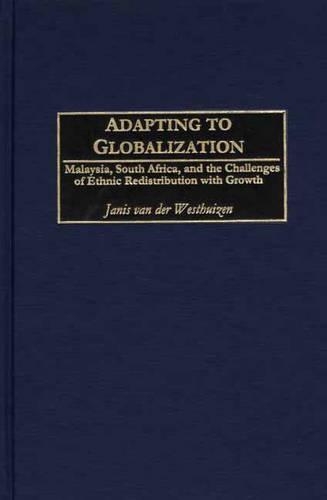
Adapting to Globalization: Malaysia, South Africa, and the Challenges of Ethnic Redistribution with Growth
(Hardback)
Publishing Details
Adapting to Globalization: Malaysia, South Africa, and the Challenges of Ethnic Redistribution with Growth
By (Author) Janis van der Westhuizen
Bloomsbury Publishing PLC
Praeger Publishers Inc
30th April 2002
United States
Classifications
Tertiary Education
Non Fiction
Globalization
Ethnic studies / Ethnicity
International economics
338.9595
Physical Properties
Hardback
224
Description
Examines how South Africa and Malaysia attempt to make domestic demands for state intervention compatible with pressures for economic liberalization. Globalization poses daunting challenges to state elites in the developing world. Caught between domestic expectations for state intervention to reduce inequalities on the one hand and global neo-liberal pressures for a liberalized economy on the other, the developing world bears the brunt of globalization's socially disruptive effects. For state elites in deeply divided societies like Malaysia and South Africa, the heightened potential for ethnic polarization makes the challenge twice as large. In both, state elites have sought to mitigate such polarization by embarking upon a program of ethnic redistribution with growth, that is, advancing subjugated ethnic majorities into the middle class through state intervention without fundamentally alienating the privileged ethnic minority upon whose economic dominance the process of social advance depends. However, what happens if globalization prevents state elites from employing ethnic redistribution with growth How do these state elites attempt to retain their legitimacy and what happens if they do not succeed Van der Westhuizen examines these issues by showing how state elites in Malaysia and apartheid South Africa successfully pursued ethnic redistribution with growth during the heydays of Keynesianism and Fordism and the complexity of such a strategy in the post-Cold War, post-Fordist world of the "competition state." He examines the ways in which Malaysia and South Africa have adapted to globalization by becoming "competition states" and the implication this process has for democratic consolidation. He provides a provocative analysis of particular interest to scholars, students, and researchers involved with development studies, international political economy, and comparative politics.
Reviews
"Janis van der Westhuizen shows how ethnically based states in Malaysia and South Africa confronting globalization generated paradoxical responses... .This is a fine delineation of how these two would-be industrializes coped with a changing global environment."-Herman M. Schwartz University of Virginia
"The analysis helps us understand both the implications of globalization for state-society relations in each of the countries and some of the factors driving increased South-South economic relations. The theoretical use of the competition state model combined with ethnic politics should be of great interest to all analysts of international and comparative political economy."-Audie Klotz University of Illinois at Chicago
Author Bio
JANIS VAN DER WESTHUIZEN is a Senior Lecturer in the Department of Political Science, University of Stellenbosch, South Africa. He has co-edited South Africa's Multilateral Diplomacy and Global Change and published numerous articles and book chapters on South African foreign policy, state and non-state responses to globalization, the political economy of popular culture, and comparative politics of Southeast Asia and Southern Africa.
